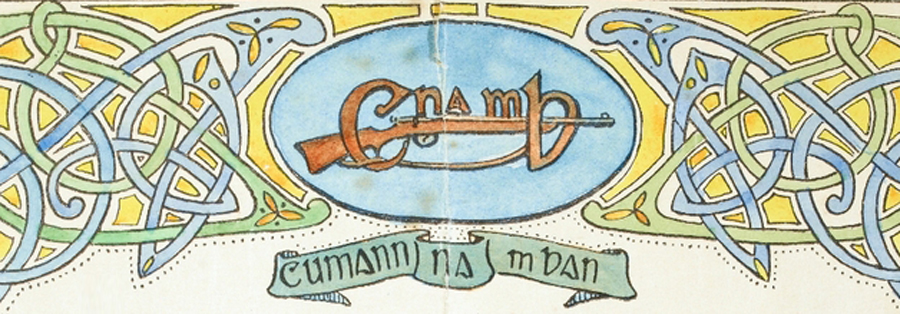Cumann na mBan convention votes against Anglo-Irish Treaty
Dublin, 6 February 1922 – Yesterday in Dublin a special convention of Cumann na mBan was held at the Mansion House at which a large majority of members voted against supporting the Anglo-Irish Treaty.
500 delegates from branches all over the country, and from overseas, were present at the convention. These included notable members such as Constance Markievicz, Mary MacSwiney and Dr Ada English.
Mary MacSwiney spoke first, and in a rousing speech put forward the following resolution: ‘The executive of Cumann na mBan reaffirms its allegiance to the Republic and therefore cannot support the Articles of Agreement signed in London on Dec. 6 1921.’
Jennie Wyse Power, arguing in favour of the treaty, agreed that the Irish people should, ‘re-affirm our allegiance to the Republic’ but also needed to realise that ‘the Treaty signed in London will, if accepted by the Irish people, be a big step along the road’.
Dr Margaret Ward, in conversation with RTÉ's Bryan Dobson, explains why Cumann na mBan rejected the Anglo-Irish Treaty
In the debate that followed, the Irish Independent noted that it quickly became obvious that the opponents of the treaty were in an overwhelming majority. ‘Speaker after speaker arose to speak against Mrs Wyse Power’s amendment and in favour of Miss MacSwiney’s motion.’ It was also noted that many of the anti-treaty speeches were deeply emotive and impassioned.
In the vote itself, the delegates answered their names with ‘For’ or ‘Against’ in Irish or in English. Mary MacSwiney cast her vote first – a resounding ‘Ní toil’ (Against). The foreign delegates were then called followed by delegates representing counties in the north and south of Ireland.
It was evident half way through the process that the anti-treaty cohort would be victorious. The final tally amounted to 419 votes for the Treaty and 63 against, a staggeringly large majority which was not predicted.
Following a jubilant response from the anti-treaty faction, Mary MacSwiney spoke once more. She graciously paid tribute to Jennie Wyse Power and her service to Ireland and then declared that Document No. 2 was now dead, promising: ‘We are going to work for the republic and not for any document’.
[Editor's note: This is an article from Century Ireland, a fortnightly online newspaper, written from the perspective of a journalist 100 years ago, based on news reports of the time.]





















